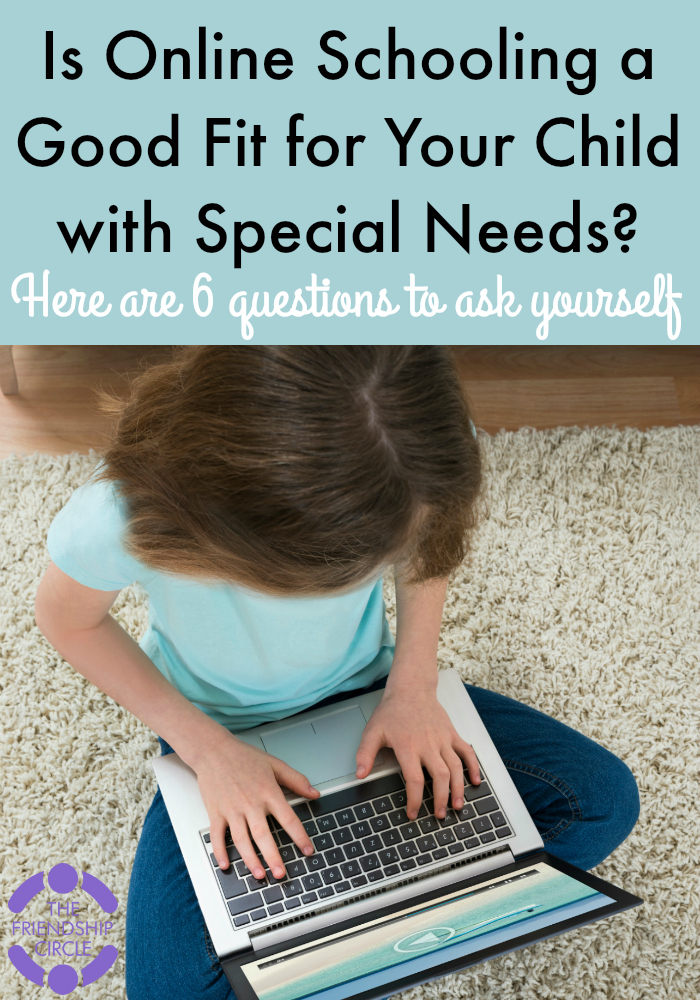
More, Parenting, Resources, Special Education 
6 Questions to Determine if Online Schooling is Right for Your Family
With online schools becoming a viable option for families as of late it leads many to wonder if it is a good fit for their child with a disability. In my almost 5 years working at a large online school in Michigan I have seen students make almost unbelievable progress and excel not only in academics but socially as well. I have also seen the opposite, students who crashed and burned and lost valuable educational time while enrolled with us.
I have compiled a list of questions to ask yourself before making the switch to online schools to ensure that your child and family are a good fit before making the commitment.
1. How much time do I have to commit each week?
One of the, if not the most influential aspects as to whether a student with a disability will be successful is parental involvement. Between emails from teachers, planning lessons, organizing materials, helping your student stay on task, scheduling needed therapies and sessions with teachers, it can easily become a full time job. If you are able to commit 30-40 hours per week to your student and have the drive to become an integral part of their educational success this could be a great opportunity for your family.2. Do I have a reliable computer, printer and internet access?
Depending on the school you may need to provide your own computer, printer and scanner. Can you get the needed equipment before your child starts online school? If your computer breaks would you be able to replace it mid year? I suggest asking what if anything the school provides in terms of computers and equipment when you call enrollment so you are prepared. You will also need to make sure that you can secure reliable, high speed internet before your child starts school. Many schools offer a reimbursement plan for internet costs but you typically need to put the money up front each month for the bill. If consistently keeping internet on is a struggle financially this may not be a good placement for your student at this time. Trying to use a neighbor's internet, Grandma's internet or the library has rarely worked out for students without internet in their home. High speed internet is also a necessity for live class sessions and therapy to work properly so unfortunately the cheaper internet carriers rarely provide the speed you need for your student to be successful in virtual school.3. Are there social opportunities available to my student outside of school?
Students who are most successful in online school have outside opportunities for socialization. We have students who participate in hockey, soccer, basketball, painting, Boy/Girl Scouts, ceramics, quilting, poetry clubs and more. It is vital for students to interact with others in their age group in a face to face setting at least a few times per week. I have seen many families who have multiple students in the school feel that sibling interaction is adequate for their child's socialization needs. I can't stress enough how important it is for students to have social opportunities outside of their home and their family. Students who do not have social engagements outside of school can sometimes become depressed or develop insecurities about future social activities.4. Does my child learn at a computer easily?
We have had many families come to our school whose students dislike computers or learning online. This is not a good recipe for success at an online school. I suggest having your student watch some educational videos and participate in free educational sites such as www.mobymax.com in order to see how they do with extended time learning on the computer. If concentrating for more than 5 minutes on an educational video or online lesson is a challenge this will likely continue and worsen as they transition to a majority of their schoolwork being online. Most online programs do send some textbooks, math manipulatives, art supplies, science experiment materials and such but the bulk of the work is done through online lessons and live classroom sessions with teachers.5. How severe are my child's needs?
While we have several students with severe disabilities doing quite well in the online learning environment there are also some for whom this setting was not a good fit. Leaving brick and mortar means there will not be a teacher, therapist, staff member present at all times to assist and facilitate your child's learning. Therapies such as Social Work, Speech and Occupational Therapy are often offered in online sessions. Lessons will be delivered online by your child's General Education and Special Education Teachers. There will likely not be a sensory room down the hall in your home and there will not be a Social Worker present if your student is having a rough day. If your student has severe needs I encourage you to talk to their current teachers about what a typical day entails in terms of staffing for your student and imagine how this will translate to your home.6. Do I have a designated spot in my home to set up a "school"?
There have been a few students who were successful just working at a table in the living room with the hustle and bustle of the family all around them but for the majority of students this isn't the case. Your designated spot does not have to large, but it is helpful to have one location that is organized and has the space necessary for both you and your student to work in. I have seen many successful designated learning spots set up by creative families over the years. Whether you convert a walk in closet, turn half of their bedroom into a learning area, transform a sun room or take over the dining room you will need a spot your student can call their own for their online learning. Online school can be a great fit for many students. The success stories I have been privileged to witness are vast and heart warming. Many students and families are beyond grateful for this opportunity that ended up being the best setting possible for them. In the end as an educator at a virtual school I want to ensure that students are in the location that works best for them. It is heart breaking to see families with the best intentions have the program not end up working out at all for them. The 6 questions I posed to families above are the most prevalent reasons I have seen for students to not be successful. As a parent I know how important it is to make a well informed decision and hope this helps parents choose an educational setting that is the right fit for their child and their family.Does your child attend school online?
Leave your feedback in the comments below!
Love this post? Pin it for later below:


